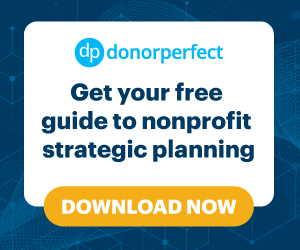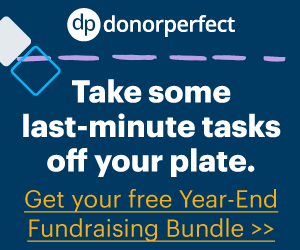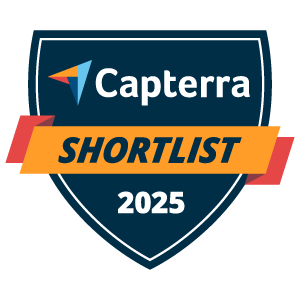1 HOUR 2 MINS
Strategies for Engaging Racially + Culturally Diverse Donors
Speakers: Tycely Williams, Chantal Bonitto, & Cherian Koshy
Categories: DPCC, 2021 Archives, Know your donors
Strategies for Engaging Racially + Culturally Diverse Donors Transcript
Print Transcript[silence]
Robbe: The donor team is committed to facilitating and encouraging critical conversations that pave the way for progress in your donor community. This keynote session, presented by DonorPerfect and AFP Global, non-profit leaders of
color Tycely Read More
[silence]
Robbe: The donor team is committed to facilitating and encouraging critical conversations that pave the way for progress in your donor community. This keynote session, presented by DonorPerfect and AFP Global, non-profit leaders of
color Tycely Williams, Chantal Bonitto, and Cherian Koshy, will examine cultural norms around cultivation and solicitation, and stewardship. Join us to discover cultural differences in donor engagement and learn how your organization
can celebrate your diverse donor base. It’s my real pleasure to introduce my friend and colleague Tycely Williams.
Over the past 20 years, Tycely has inspired individuals and institutions to invest more than a hundred million in charitable causes. She leads the AFP Global Inclusion, Diversity, Equity, and Access, the IDEA Committee. Teaches
fundraising and leadership at Penn State University, and currently serves as the chief development officer for the Bipartisan Policy Center, a Washington DC-based think tank that actively fosters bipartisanship by combining the best
ideas from both parties to promote health, security, and opportunities for all Americans.
Chantal Bonitto is an organizational leader in the space of diversity, equity and inclusion, and a seasoned development expert in the non-profit sector. Her career has been dedicated to identifying and creating resources for
institutions that benefit the most marginalized communities in our society. Chantal’s for justice, equity, inclusion, and the power of women’s philanthropy has made her an insightful leader in the future of resource development.
Cherian Koshy is an accomplished trainer and speaker with more than two decades of experience. As a coach and consultant, he’s led organizations to scale their revenue growth and build stronger teams. He’s led several successful
multimillion-dollar capital campaigns and worked with a wide variety of non-profits, including arts, human services, faith-based, and education. His industry-specific thought leadership has been featured in keynote presentations, blogs,
webinars, workshops, and podcasts. We now welcome Tycely to convene this outstanding panel.
Tycely: Thank you so much, Robbe. Really appreciate your many years of service. We have all learned so much from you about the importance of inclusion, diversity, equity, and access. I am delighted to welcome all of you. We are excited
to thank DonorPerfect for the opportunity to really just have a very engaging, authentic, and actionable conversation.
As we look to the calendar, I must wish everyone a happy Global Diversity Awareness Month. People around the globe, cultures and many corners of the world are celebrating what is actually unique about being a part of the human race, and
that is the uniqueness that each of us bring that contributes to diversity.
I’m delighted to be with two very dear friends who have promised that they are going to also be authentic yet actionable. It seems as if we’re are gathered here today to talk about something that a lot of us know a lot about and that’s
diversification. As relationship builders and as frontline fundraisers, we understand the fact that when you are crafting a strategy and executing on tactics, that we would never solely rely on one source of revenue stream. We’re
seasoned enough to know that with diversity comes an element of strength, but yet when we tie racial and cultural to the concept of diversity, that can lead some of us to places and spaces of discomfort.
I think it’s largely because our lived experiences gift comfort. I’m really excited to center not only your intellect but to also showcase how through your unique identities as people of color who have excelled as someone who is often
representing an identity that is within the minority, or an identity that is not as prominent and prevalent. You’ve done that in ways where you have not discounted or diminished your individual cultural identities. We want to invite you
to help all of us who identify as lifelong learners, which all of us who’ve signed up for this conference does a commonality there, we are all lifelong learners.
We want to dig into a bit more on the strategy side. Chantal, I’d like to start with you. I think when you think about the complexity attached to how to engage racially and culturally diverse donors, it can seem rather overwhelming, but
I know that you’ve had some success introducing simple, actionable tactics. I want to invite you to talk with us a little bit about how you’ve been a success within past organizations and how we may be able to accelerate our growth by
learning from you.
Chantal: Well, thank you so much, Tycely, for inviting me to this table. I just want to wish everyone here, it’s 314, 15 counting, good health and emotional resilience in this time. Like many people in this pandemic, I had a baby, I
chopped off my hair, and I put on and lost weight and put it back on again. I just want to acknowledge that we are in a collective crisis and I wish you all very well in this time as we gather in community to talk about this work. I
just know that it will be with us for a generation, and it’s really accelerated our thinking around inclusive philanthropy in a way that we’re having this conversation.
I wonder if we weren’t in this global crisis, I wonder if sadly, George Floyd, his murder wasn’t caught on video, I wonder if this collective consciousness around the importance of belonging and diversity and equity and inclusion and
justice would be at the forefront of our minds, so I just want to start there.
I also want to acknowledge the AFP New York City Mentorship Program through the Emerging Leader’s group, I was introduced to you both by Elandria Jackson, who I met through the mentorship program. I’m supposed to be a mentor, but in
many ways, we are peer mentors. I’m very grateful for her introduction of us.
I know through our conversation, we talked about a framework that I developed that I call the ABC Framework and I want to go deeper into that first if you don’t mind. I have my timer on. I’m just going to share [laughs] a little bit and
then we’ll get into that.
I have a 15-year career in major gifts, in fundraising overall, and I started as a major gifts assistant at Memorial Sloan Kettering Cancer Center for the society. It was a different subset than this huge fundraising machine. It was a
small community and I didn’t see myself reflected in the donors that were involved or in the staff that was working there.
What’s interesting as I moved into events, because I saw more people of color and events, I was leaving the office and this Black woman walked in and out, and I said, “Who are you? What are you doing here?” She said, “Oh, I’m the former
director of development.” Her name is V. Renée Cutting. She’s currently the CDO at UNICEF. I saw her and I was like, “Oh my gosh. Here I am fresh out of school.” I’m like, “It’s possible. Here she is. She’s at the top of her game in
fundraising. I see her. I can do that, so I’m going to come back.”
I think it’s important for this panel to also be an example of other young people. There’s a pipeline of professionals as well. I think we need to know that we can excel in this sector. I’m excited to represent that too.
I went to Oberlin College as an undergrad. I was lucky enough to cross paths with Rashida Bumbray and heard her speak even after we graduated. She shared something at a talk around creating a world beyond our own imagination.
It really resonated with me. As someone that works in fundraising and philanthropy, what does the future of our sector look like, from a donor perspective, and from a professional perspective? One of my goals is to help create a space
in fundraising and philanthropy beyond my own imagination. Yes, I am a lifelong learner, I’m learning every day around how I can contribute fully to this sector, and to the people coming up behind us.
My parents are immigrants. They came from Jamaica and Panama respectively. My mother came here before the term Dreamer existed. She was a person that was undocumented. She did not speak English. She was 15, and she became pregnant with
me. I can’t even imagine what that was like. She’s fiercely independent, even today. Really, what I appreciate about the experience of having teen parents and figuring life out and growing up along with them, was that they wanted me to
have a leg up. Education was a top priority. There was wanting to be to take advantage of programs that could help me accelerate.
I’m a beneficiary of the nonprofit sector in many ways. When she was pregnant with me, she went to a Planned Parenthood, they pointed her in the right direction to have a full and complete viable pregnancy. After-school programs, when I
was a young person, I also went to Brooklyn Music School, singing classical music, and that really helped me a lot. I was a peer sex educator teaching peers in Brooklyn around how to protect themselves from HIV, where to get testing
through theater. That was really wonderful.
When I started working in philanthropy, it so happened, I came out of public relations as a young person thinking, “Oh, this is what I want to do,” and quickly moved into the nonprofit sector because I felt like I was making a real
difference. There were no people of…
Related resources
Constituents Page
Nonprofit Expert Episode 40 – How Mission-Driven Nonprofits Use Data to Support Growth and Stewardship
Donor Connection Guide: Why Engagement Isn’t Enough
Get the Donor Connection Guide






